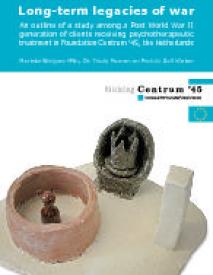Long-term legacies of war: An outline of a study among a Post World War II generation of clients receiving psychotherapeutic treatment in Foundation Centrum '45, the Netherlands
Introduction
“Camp is not so much a place as a condition. “I’ve had camp,” he says. That makes him different from us. We’ve had chicken pox and German measles. And after Simon fell out of a tree, he got concussion and he had to stay in bed for weeks. But we never had camp.“
- Nightfather, Carl Friedman; novel about a man’s experiences in the Nazi concentration camps as seen through the eyes of his children -
Both clinical observations and research studies have consistently demonstrated that survivors of extreme, prolonged stress are susceptible to enduring physical and psychological impairment. Consequently, a mental disorder or chronic physical illness in one or both parents is likely to adversely affect the spouse and children. War negatively impacts the previously functional coping mechanisms within families and society.
Many studies have been published on the transmission of trauma from - Holocaust -survivors to their children (Kellermann, 2000). While many clinicians tend to generalize their findings to apply to most children of war survivors, most empirical research could not substantiate the claim that there was more psychopathology in children of survivors than in comparable populations (e.g., Van der Velden, 1999; Van IJzendoorn et al, 2003). However, there appears to be sufficient evidence that children of trauma survivors constitute a high-risk group for mental disturbances (Baider et al, 2006; Solomon, 1988; Yehuda, 2006).
The ability of children to deal with their parents' psychological burden depends on many factors. There is considerable evidence that parental psychological disorder increases the risk of disturbance in child development and poor mental health in adulthood, although many of the children also show resilience.
15 p | Oegstgeest : Stichting Centrum '45


